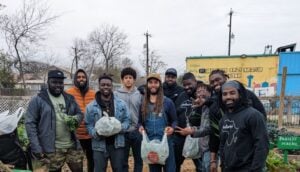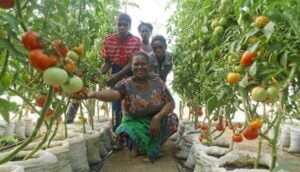Over 60% of the world’s employed population make their living through informal work, with no access to formal contracts or protection. Women make up a disproportionate percentage of informal workers, with 740 million women’s livelihoods dependent on the informal economy globally. Lack of secure employment contracts or social protection for these workers means that when shock events occur, such as Covid-19 or climate-related emergencies, it is these women who experience the worst impacts.
In Bangladesh, Shaila, a single mother of two, worked at a factory supplying major international fashion brands. When Covid hit, Shaila was one of several hundred workers laid off without pay. When the factory reopened, she was told that she no longer had a job and received no severance pay. With no job, savings, or financial security, Shaila could not pay her rent and her landlord evicted her and her children. They spent the night on the street, where their belongings were stolen.
Whilst businesses know that informal women workers like Shaila play essential roles in production and agricultural supply chains globally, lack of supply chain transparency means that they are typically the hardest group to reach. During shock events, when continuity is halted and prices rapidly increase, it is the least visible workers at the beginning of supply chains who are hit the hardest. This presents serious human rights and reputational risks for companies.
COP27 has now starkly warned businesses that the climate crisis is increasing the rate of supply chain shock events, meaning these challenges will become more frequent.
ActionAid UK recently hosted a roundtable to discuss these issues with companies across a range of sectors. Reflecting on disruption caused by the pandemic, businesses discussed how difficult decisions were made by many to protect commercial interests, such as to cancel orders. As a result, in many cases, workers in supplier communities went unpaid, creating mass unemployment and hardship. The people with least protection – those in the informal economy – received little or no support.
Businesses also broadened and diversified their supplier base to increase their stability. However, an absence of adequate due diligence checks and oversight of working conditions, made more challenging by Covid-19 travel restrictions, meant that worker’s rights were put at further risk, and companies faced greater human rights, legal and reputational risks.
Typically, businesses manage risks in their supply chains through taking a tiered approach. In theory, mapping tiers will highlight the riskiest suppliers. In reality, a large proportion of production in supply chains relies on suppliers outside of the formal economy, making comprehensive tiered mapping impossible.
So, how can businesses both address human rights risks and improve business continuity during shocks by investing in informal women workers?
Each supply chain has its own contextual challenges, but these challenges can be addressed in partnership with organisations like ActionAid who partner with workers, their communities, and workers’ organisations to enable women to claim their rights.
ActionAid, alongside leading businesses, has successfully mobilised workers to claim rights as a collective, through creating platforms for dialogue so that workers can highlight the impact of business practices on their lives. They reveal the challenges that are hidden from businesses and offer solutions that strengthen the supply system. Most importantly, women are able to access their rights and improve their working conditions.
ActionAid’s recent partnerships with international retailers for example, have strengthened women garment workers’ rights. Through the creation of ‘Workers’ Cafés’, spaces where female workers can receive information about their rights and entitlements in the workplace, women have been empowered to understand their rights and take a lead in sharing advice with others, as well as support factory-level dispute resolution. Our Worker Café model is so valuable as it is rooted in the community rather than the factory, enabling more sustainable change.
Solving rights issues in complex supply systems is not a quick and simple process. However, investing in informal workers in your supplier communities can lead to effective and sustainable solutions.
If you’re interested in finding out more about ActionAid’s work, or would like to explore opportunities for partnership, please contact our Private Sector Partnerships team at uk**********************@ac*******.org.










